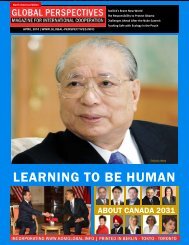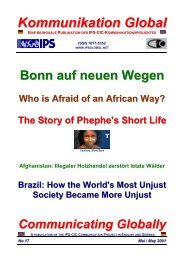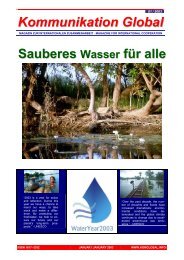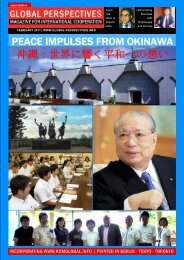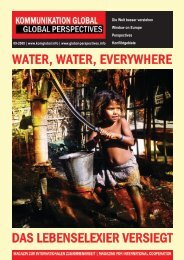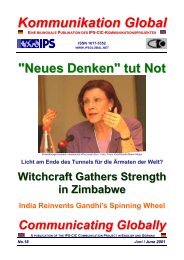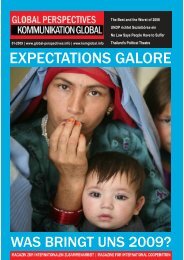GLOBAL PERSPECTIVES | Second Quarterly 2013 â North America ...
GLOBAL PERSPECTIVES | Second Quarterly 2013 â North America ...
GLOBAL PERSPECTIVES | Second Quarterly 2013 â North America ...
You also want an ePaper? Increase the reach of your titles
YUMPU automatically turns print PDFs into web optimized ePapers that Google loves.
<strong>GLOBAL</strong> <strong>PERSPECTIVES</strong> - SECOND QUARTERLY <strong>2013</strong><br />
NUKE ABOLITION<br />
Civil Society Raises Pressure Over NPT<br />
By Ravi Kanth Devarakonda<br />
GENEVA - As parties to the treaty on the Non-Proliferation<br />
of Nuclear Weapons (NPT) begin their second preparatory<br />
conference in Geneva on Monday, representatives of civil<br />
society and several countries have decided to bring the<br />
festering nuclear issue and its potential humanitarian consequences<br />
to the centre stage.<br />
“The NPT has its own process and business as usual,” said<br />
Rebecca Johnson, co-chair for the International Campaign<br />
to Abolish Nuclear Weapons (ICAN), a Geneva-based global<br />
coalition of pressure groups working on disarmament and<br />
a ban on nuclear weapons.<br />
The Geneva preparatory committee meeting will focus on a<br />
range of issues for the next two weeks to prepare the<br />
agenda for the 2015 Review Conference which will take<br />
place in Geneva.<br />
More importantly, it is taking place against the backdrop of<br />
rising nuclear tensions in the Korean peninsula and Iran’s<br />
nuclear enrichment programme. Also, several countries<br />
held an international conference on the Humanitarian Impact<br />
of Nuclear weapons in Oslo last month.<br />
“My hope is that a large number of countries talk (at the<br />
Geneva meeting) about the importance of bringing the<br />
nuclear issue back to human level and understanding the<br />
humanitarian consequences because of nuclear weapons,”<br />
Johnson told IPS.<br />
She expects that a large number of parties to the NPT will<br />
sign up to the South African statement on the human dimension<br />
of nuclear weapons which will be delivered at the<br />
meeting. “We want a sustained dialogue on the humanitarian<br />
impact so that it changes the balance of power in the<br />
NPT,” Johnson argued.<br />
The NPT came into force in 1970 with the avowed goal of<br />
stopping countries from building a nuclear bomb. So far,<br />
189 countries have ratified the treaty while India, Israel,<br />
and Pakistan refused to become parties to it. All three<br />
countries possess a nuclear arsenal, with total estimates<br />
varying from 50 to 200 nuclear weapons.<br />
The official nuclear weapon states – the United States, Russia,<br />
Britain, France, and China who are known as P5 – are<br />
required to implement measures under the treaty to “cessation”<br />
of the nuclear arms race, and complete nuclear<br />
“disarmament”. The five nuclear weapon states held a<br />
meeting last week during which they discussed promoting<br />
dialogue and mutual confidence on nuclear issues.<br />
The P5 members exchanged views on various issues concerning<br />
“non-proliferation”, “the peaceful uses of nuclear<br />
energy”, and “disarmament” – known as the three pillars of<br />
the NPT.<br />
The five nations, who are the permanent members of the<br />
United Nations Security Council, reaffirmed their commitment<br />
to the goal of nuclear disarmament.<br />
However, progress on nuclear disarmament is almost limited<br />
or negligible over the last 45 years. “There is not much<br />
progress on nuclear disarmament and we need a new dynamic<br />
to break the paralysis, otherwise there will be new<br />
cold war,” said Martin Hinrichs, an ICAN activist. Representatives<br />
of ICAN from some 16 countries held a brainstorming<br />
session on how to go about their advocacy campaign<br />
during the NPT meeting this week.<br />
“They (the P5) have got a vested interest and they constructed<br />
their industry, defence industries, and military to<br />
deploy, to possess, and to modernise nuclear weapons,”<br />
said Johnson.<br />
The P5 members, says Johnson, “have a vested interest in<br />
keeping the status quo and stopping new countries entering<br />
the nuclear club.” Besides, they enjoy numerous privileges<br />
because of their status and it would be a mistake to<br />
think that they would implement substantive measures<br />
towards complete nuclear disarmament, she said.<br />
So, the “game” for the elimination of nuclear weapons will<br />
not start from the P5 side who wield powerful nuclear<br />
weapons, Johnson said.<br />
“What has to change is that the non-nuclear states have to<br />
start things to bring about nuclear disarmament,” the ICAN<br />
co-chair argued. “They (the non-nuclear weapon states)<br />
have the power and tools to change by becoming aware<br />
that nuclear weapons are a humanitarian problem even if<br />
they are set in the international legal and political rules.”<br />
Therefore, it is important not to give exalted status to the<br />
nuclear arms states every time on the hope that they would<br />
carry out disarmament. “The non-nuclear weapon states<br />
are not supplicants, and they have to engage in politics and<br />
change international relations by joining forces with civil<br />
society,” Johnson asserted. The international ban movement<br />
intends to delegitimise nuclear weapons for everybody<br />
so that countries are dissuaded from spending billions<br />
of dollars on nuclear weapons. [IPS | April 21, <strong>2013</strong>]<br />
<br />
- 39 -




